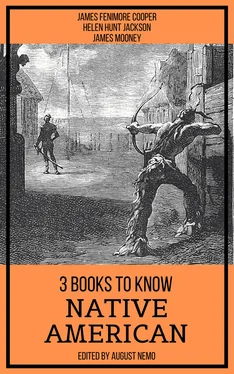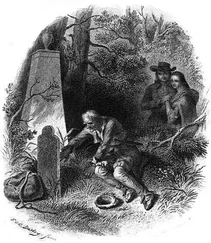“And am I answerable that thoughtless and unprincipled men exist, whose shades of countenance may resemble mine?” Cora calmly demanded of the excited savage.
“No; Magua is a man, and not a fool; such as you never open their lips to the burning stream: the Great Spirit has given you wisdom!”
“What then have I to do, or say, in the matter of your misfortunes, not to say of your errors?”
“Listen,” repeated the Indian, resuming his earnest attitude; “when his English and French fathers dug up the hatchet, Le Renard struck the war-post of the Mohawks, and went out against his own nation. The pale-faces have driven the redskins from their hunting-grounds, and now when they fight, a white man leads the way. The old chief at Horican, your father, was the great captain of our war-party. He said to the Mohawks do this, and do that, and he was minded. He made a law, that if an Indian swallowed the fire-water, and came into the cloth wigwams of his warriors, it should not be forgotten. Magua foolishly opened his mouth, and the hot liquor led him into the cabin of Munro. What did the gray-head? let his daughter say.”
“He forgot not his words, and did justice by punishing the offender,” said the undaunted daughter.
“Justice!” repeated the Indian, casting an oblique glance of the most ferocious expression at her unyielding countenance; “is it justice to make evil, and then punish for it? Magua was not himself; it was the fire-water that spoke and acted for him! but Munro did not believe it. The Huron chief was tied up before all the pale-faced warriors, and whipped like a dog.”
Cora remained silent, for she knew not how to palliate this imprudent severity on the part of her father, in a manner to suit the comprehension of an Indian.
“See!” continued Magua, tearing aside the slight calico that very imperfectly concealed his painted breast; “here are scars given by knives and bullets — of these a warrior may boast before his nation; but the gray-head has left marks on the back of the Huron chief, that he must hide, like a squaw, under this painted cloth of the whites.”
“I had thought,” resumed Cora, “that an Indian warrior was patient, and that his spirit felt not, and knew not, the pain his body suffered.”
“When the Chippewas tied Magua to the stake, and cut this gash,” said the other, laying his finger on a deep scar, “the Huron laughed in their faces, and told them, Women struck so light! His spirit was then in the clouds! But when he felt the blows of Munro, his spirit lay under the birch. The spirit of a Huron is never drunk; it remembers forever!”
“But it may be appeased. If my father has done you this injustice, show him how an Indian can forgive an injury, and take back his daughters. You have heard from Major Heyward —”
Magua shook his head, forbidding the repetition of offers he so much despised.
“What would you have?” continued Cora, after a most painful pause, while the conviction forced itself on her mind that the too sanguine and generous Duncan had been cruelly deceived by the cunning of the savage.
“What a Huron loves — good for good; bad for bad!”
“You would then revenge the injury inflicted by Munro on his helpless daughters. Would it not be more like a man to go before his face, and take the satisfaction of a warrior?”
“The arms of the pale-faces are long, and their knives sharp!” returned the savage, with a malignant laugh: “why should Le Renard go among the muskets of his warriors, when he holds the spirit of the gray-head in his hand?”
“Name your intention, Magua,” said Cora, struggling with herself to speak with steady calmness. “Is it to lead us prisoners to the woods, or do you contemplate even some greater evil? Is there no reward, no means of palliating the injury, and of softening your heart? At least, release my gentle sister, and pour out all your malice on me. Purchase wealth by her safety, and satisfy your revenge with a single victim. The loss of both of his daughters might bring the aged man to his grave, and where would then be the satisfaction of Le Renard?”
“Listen,” said the Indian again. “The light eyes can go back to the Horican, and tell the old chief what has been done, if the dark-haired woman will swear by the Great Spirit of her fathers to tell no lie.”
“What must I promise?” demanded Cora, still maintaining a secret ascendency over the fierce native, by the collected and feminine dignity of her presence.
“When Magua left his people, his wife was given to another chief; he has now made friends with the Hurons, and will go back to the graves of his tribe, on the shores of the great lake. Let the daughter of the English chief follow, and live in his wigwam forever.”
However revolting a proposal of such a character might prove to Cora, she retained, notwithstanding her powerful disgust, sufficient self-command to reply, without betraying the weakness.
“And what pleasure would Magua find in sharing his cabin with a wife he did not love; one who would be of a nation and color different from his own? It would be better to take the gold of Munro, and buy the heart of some Huron maid with his gifts.”
The Indian made no reply for near a minute, but bent his fierce looks on the countenance of Cora, in such wavering glances, that her eyes sank with shame, under an impression that, for the first time, they had encountered an expression that no chaste female might endure. While she was shrinking within herself, in dread of having her ears wounded by some proposal still more shocking than the last, the voice of Magua answered, in its tones of deepest malignancy —
“When the blows scorched the back of the Huron, he would know where to find a woman to feel the smart. The daughter of Munro would draw his water, hoe his corn, and cook his venison. The body of the gray-head would sleep among his cannon, but his heart would lie within reach of the knife of Le Subtil.”
“Monster! well dost thou deserve thy treacherous name!” cried Cora, in an ungovernable burst of filial indignation. “None but a fiend could meditate such a vengeance! But thou overratest thy power! You shall find it is, in truth, the heart of Munro you hold, and that it will defy your utmost malice!”
The Indian answered this bold defiance by a ghastly smile, that showed an unaltered purpose, while he motioned her away, as if to close the conference forever. Cora, already regretting her precipitation, was obliged to comply, for Magua instantly left the spot, and approached his gluttonous comrades. Heyward flew to the side of the agitated female, and demanded the result of a dialogue that he had watched at a distance with so much interest. But unwilling to alarm the fears of Alice, she evaded a direct reply, betraying only by her countenance her utter want of success, and keeping her anxious looks fastened on the slightest movements of their captors. To the reiterated and earnest questions of her sister, concerning their probable destination, she made no other answer than by pointing towards the dark group, with an agitation she could not control, and murmuring, as she folded Alice to her bosom —
“There, there; read our fortunes in their faces; we shall see; we shall see!”
The action, and the choked utterance of Cora, spoke more impressively than any words, and quickly drew the attention of her companions on that spot where her own was riveted with an intenseness that nothing but the importance of the stake could create.
When Magua reached the cluster of lolling savages, who, gorged with their disgusting meal, lay stretched on the earth in brutal indulgence, he commenced speaking with the dignity of an Indian chief. The first syllables he uttered had the effect to cause his listeners to raise themselves in attitudes of respectful attention. As the Huron used his native language, the prisoners, notwithstanding the caution of the natives had kept them within the swing of their tomahawks, could only conjecture the substance of his harrangue, from the nature of those significant gestures with which an Indian always illustrates his eloquence.
Читать дальше












